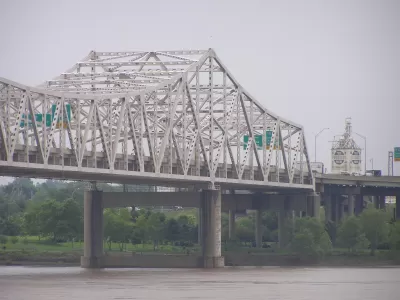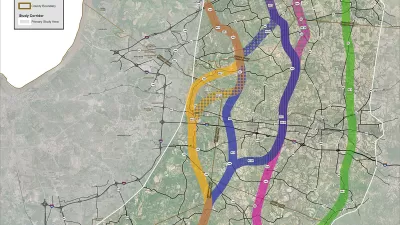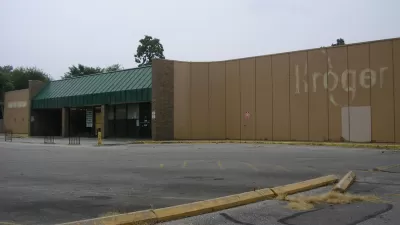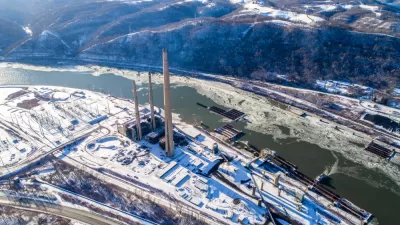Aaron Renn says the bridge projects in and near Louisville, Kentucky, were too expensive and have not led to any positive transportation or economic results.

In a piece on his blog, Aaron Renn writes about the Louisville-Southern Indiana Ohio River Bridges Project, which he says he was skeptical about back in 2007 when the proposal was first floated.
After taking a closer look at the traffic data, he says the outcome is even worse than he imaged. “The project has proven to be a money waster of the highest order, and in fact by far the biggest American transportation boondoggle I can identify in the 21st century so far,” says Renn.
The Interstate 65 bridge is a parallel span connecting Louisville, Kentucky, to Jefferson, Indiana, and it doubled the number of lanes across the river. The East End Crossing is a new bridge built up the river from downtown Louisville. The price tag for each bridge was $1.38 billion, and both crossings added tolls to help cover the project costs. The result, says Renn, is that traffic shifted to the two free bridges in the area, and the number of vehicles on the I-65 bridge dropped 50 percent between 2013 and 2018.
He also argues that expanding the crossing in downtown Louisville sliced up the area in detrimental ways. In addition, he points to data showing that truck traffic on the I-65 spans dropped by over 30 percent. “Where did they go? If you are a region that’s banking on the distribution industry for a big part of your future blue-collar employment growth, the tolls on these bridges can’t be good news. That’s particularly true when no surrounding competitor city has tolls.”
Renn says the bridge project made no sense, both from a transportation perspective and a fiscal one. And at a time when states claim funding for transportation projects is tight, pouring money into a project like this one, while better projects fall by the wayside, is problematic, he says. “This boondoggle didn’t happen by accident. It wasn’t a result of ignorance. It was well known in advance that it was a bad idea. It was a deliberate, conscious choice.”
FULL STORY: Louisville Bridges Project Is the Biggest Transportation Boondoggle of the 21st Century

Planetizen Federal Action Tracker
A weekly monitor of how Trump’s orders and actions are impacting planners and planning in America.

Restaurant Patios Were a Pandemic Win — Why Were They so Hard to Keep?
Social distancing requirements and changes in travel patterns prompted cities to pilot new uses for street and sidewalk space. Then it got complicated.

Map: Where Senate Republicans Want to Sell Your Public Lands
For public land advocates, the Senate Republicans’ proposal to sell millions of acres of public land in the West is “the biggest fight of their careers.”

Maui's Vacation Rental Debate Turns Ugly
Verbal attacks, misinformation campaigns and fistfights plague a high-stakes debate to convert thousands of vacation rentals into long-term housing.

San Francisco Suspends Traffic Calming Amidst Record Deaths
Citing “a challenging fiscal landscape,” the city will cease the program on the heels of 42 traffic deaths, including 24 pedestrians.

California Homeless Arrests, Citations Spike After Ruling
An investigation reveals that anti-homeless actions increased up to 500% after Grants Pass v. Johnson — even in cities claiming no policy change.
Urban Design for Planners 1: Software Tools
This six-course series explores essential urban design concepts using open source software and equips planners with the tools they need to participate fully in the urban design process.
Planning for Universal Design
Learn the tools for implementing Universal Design in planning regulations.
Heyer Gruel & Associates PA
JM Goldson LLC
Custer County Colorado
City of Camden Redevelopment Agency
City of Astoria
Transportation Research & Education Center (TREC) at Portland State University
Camden Redevelopment Agency
City of Claremont
Municipality of Princeton (NJ)





























